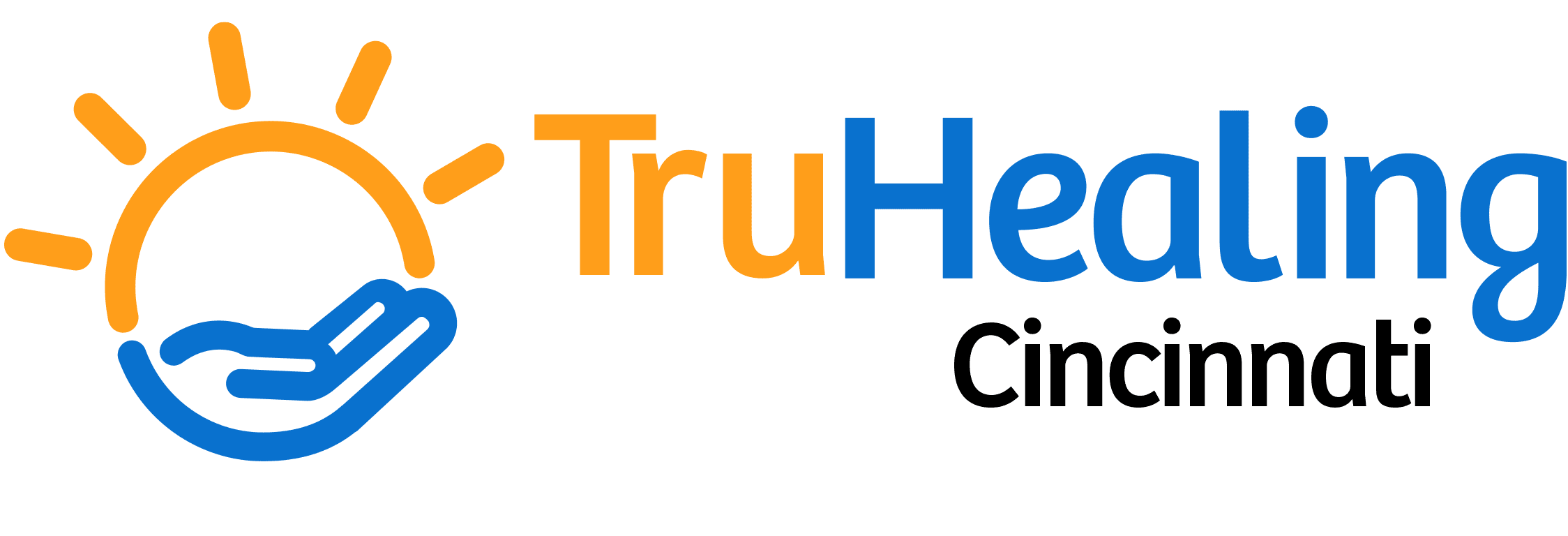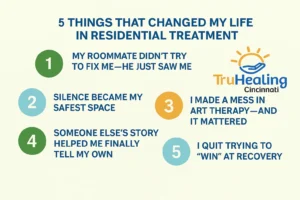When I walked into a residential treatment program in Cincinnati, I was 24, newly sober, and completely unsure if I belonged there. Everyone else seemed older, more broken, or more ready. I felt like the weird one—too young, too awkward, too unsure of whether I really had a “problem.”
I expected therapy, structure, some uncomfortable truths. What I didn’t expect were the quiet moments, strange breakthroughs, and honest conversations that would change me in ways I’m still figuring out.
This isn’t a list of recovery cliches. These are five things that genuinely changed my life in residential treatment—and none of them were what I thought I needed.
1. My roommate didn’t try to fix me—he just saw me
There’s this weird pressure when you’re new in treatment to show up like you already know what you’re doing. I was trying to be the funny guy. The “I got this” guy. The guy who didn’t need to cry.
One night, I was cracking a joke (again), and my roommate looked up from folding his laundry and said, “You don’t have to be ‘on’ all the time. You’re allowed to be a mess.”
He didn’t say it with judgment. He said it like someone who knew what hiding looked like—because he used to do it too.
That moment broke something open. I realized that vulnerability isn’t weakness. It’s just honesty without the costume.
2. Silence became my safest space
I used to fill every silence with music, scrolling, sarcasm—anything but stillness. Being alone with my thoughts felt like walking into a room where someone might yell at me (even if that “someone” was just me).
In residential treatment, there were built-in moments of silence. After groups. During meals. On walks. At first, they made me itch. I wanted noise.
But slowly, something shifted. I started listening—to myself, to my breath, to the weird hum of my nervous system trying to regulate for the first time in years. The silence stopped feeling like punishment. It started to feel like safety.
That’s when I started to notice my real thoughts. Not the loud ones, the quiet ones. The ones that said, Maybe I can get better. Maybe I don’t have to go back to that life.
3. I made a mess in art therapy—and it mattered
I wasn’t an “express yourself through colors” kind of person. I rolled my eyes at art therapy so hard I practically strained a muscle.
Then they told us to paint what our addiction felt like. I drew a big black box with sharp red streaks. And suddenly I couldn’t stop crying. I didn’t even know why. It wasn’t a masterpiece. It wasn’t even good. But it was real.
Something about using my hands to show what my words couldn’t say—it shifted things inside me. It let grief rise to the surface in a way talking never did.
I still don’t paint much. But I’ve learned that sometimes healing comes from the things you don’t think you’ll relate to. It sneaks up on you.
4. Someone else’s story helped me finally tell my own
There was this older guy in our group—mid-40s, super quiet, used to be a musician. I assumed we had nothing in common. He seemed so serious, so distant.
Then one day, he shared a story about hiding bottles in his guitar case. And I remembered the way I used to stash vape pens in my sock drawer. Different tools, same shame.
I hadn’t told anyone about that before. Not even my best friend.
His story gave me permission to tell mine. Not just the surface stuff—but the stuff that made me feel small, scared, and strange. And in doing that, I stopped feeling like such a freak. Because our details were different—but our feelings? Way too similar to ignore.
5. I quit trying to “win” at recovery
I came into treatment like I came into everything else—trying to be the best at it. First to finish journaling. Always on time. Saying the “right” things in group. Trying to impress the counselors without even realizing it.
It was exhausting.
The breakthrough came during an individual session. I told my therapist I didn’t feel like anything was working. That I wasn’t feeling the big “aha” moments people kept talking about. She said, “That’s okay. You’re allowed to just be here. You don’t have to perform.”
Nobody had ever said that to me before. Not at school, not at home, not in sports. I didn’t have to be impressive to be enough.
So I stopped trying to be the “good” client. I started being the real one. Messy, confused, tired, honest. And that’s when recovery started to feel possible—not because I was nailing it, but because I was showing up as myself.
The Real Transformation Wasn’t What I Expected
If you’re young and sober—or just trying to be—you probably know what it feels like to be the odd one out. The friend who isn’t drinking. The person in their 20s talking about trauma instead of parties. The one asking, “What now?”
You’re not alone. And you’re not broken for needing help earlier than some people ever do. In fact, getting help early is one of the bravest, smartest things you can do.
At TruHealing Cincinnati, the residential treatment program isn’t about turning you into a perfect sober robot. It’s about giving you space to figure out who you are without the substances that were numbing you.
Whether you’re nearby in Cincinnati or looking for a residential treatment program in Louisville, Kentucky, they’ve got real people, real support, and a vibe that doesn’t feel fake or corporate.
FAQs About Residential Treatment (That I Wish Someone Answered Honestly)
Do I have to hit rock bottom to go to residential treatment?
No. That’s a myth. You don’t need to lose everything or hit some dramatic low to deserve help. If substances are messing with your life—even a little—you qualify for care.
Will I be the youngest person there?
Maybe. Maybe not. But being young doesn’t make you less serious about recovery. It just means you’re catching it early—and that’s powerful.
What happens all day in residential treatment?
It’s structured. You’ll have group therapy, individual therapy, activities, maybe art or music. But you’ll also have downtime, meals, walks, and time to just be. The mix of structure and space is what makes it work.
Do I have to share everything in group?
Nope. You share when you’re ready. Nobody’s grading you. Most people start small—and that’s fine. Sometimes just listening is enough at first.
What if I don’t feel “bad enough” to need treatment?
This one’s real. I felt that way too. But pain isn’t a competition. If you’re suffering—even if it’s quiet suffering—you deserve to feel better. Don’t wait for it to get worse.
Ready to stop performing and start healing?
If you’re ready for something real—support that doesn’t talk down to you, a place that sees you even when you feel like a weirdo in recovery—TruHealing Cincinnati’s residential treatment program is worth checking out.
Call (888) 643-9118 or visit the link above to get the details. Whether you’re in Ohio or looking for residential treatment in Lexington, Kentucky, they’ve got your back.
You don’t need to have it all figured out. You just need to start.


